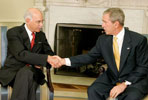
Andrew Natsios, the former head of the United States Agency for International Development and a special envoy to Sudan in the Bush Administration, has a new piece on Sudan up on ForeignAffairs.com. For those of you who do not remember Natsios, he is the same gentleman who assured the American public in April 2003 that the cost to taxpayers for rebuilding Iraq would absolutely be no more than 1.7 billion dollars. (“The American part of this will be 1.7 billion. We have no plans for any further-on funding for this," said Natsios in a statement that was so far off that it has joined ‘Mission Accomplished’ in the pantheon of disastrous policy pronouncements.)
In his Foreign Affairs piece, Natsios brings the same savvy sense of judgment and comes down hard on the arrest warrant for Bashir, insisting that it will only make peace impossible. Natsios, like several others, just gets it plain wrong. The fact that the International Criminal Court would hold Bashir accountable is not the real impediment to peace in Sudan; the fact that Bashir keeps committing war crimes is the real impediment to peace in Sudan. Because diplomats like Natsios have been eager to sweep these mass killings under the rug for years is exactly why Bashir thinks he can literally get away with murder.
Natsios also makes the case that the indictment is somehow a form of neo-colonialism but derides traditional Darfuri justice and reparation efforts:
The traditional form of reparation in Darfur has been blood money paid by the perpetrator to the victim’s family — a mechanism that, before the ICC’s intervention, the Darfuri rebels accepted (albeit at a high asking price) and Khartoum obliged with in the form of reconstruction money (accompanied with some self-serving rhetoric).
If anyone sounds like a clumsy neo-colonialist here, it is Natsios. First, we are not sure what Natsios means by “traditional,” but we do not think that most Darfuris would appreciate him reducing their complex cultural traditions to greedy and corrupt bargaining over the loss of their loved ones. Natsios does not even bother to take into account the perspective of any of the families or the victims.
Natsios admits up front in the article that the government of Sudan has conducted numerous war crimes. He then shamefully quibbles about the numbers of dead in Darfur during the last year, as if Darfuris and the world should be somehow less appalled because Bashir has slowed down the pace with which he kills people.
Natsios concludes his masterwork by essentially arguing that the Comprehensive Peace Agreement, or CPA, that ended the North-South war must be pursued to the exclusion of all other efforts in Sudan, such as the arrest warrant or a lasting peace inn Darfur. No one has ever said that CPA implementation is not absolutely imperative. However, with Bashir now having cut off direct aid to more than a million people in Darfur, shouldn’t trying to keep them alive perhaps also figure into the grand scheme of things? The tactics being used in Darfur are a replica of those used by Khartoum in the earlier war with the South, and Sudan will never achieve lasting peace in the South, West or East as long as the international community allows Khartoum to engage in such practices with impunity. If the new Special Envoy for Sudan, Scott Gration, is looking for a textbook on how not to deal with Sudan, Andrew Natsios has helpfully offered his own well-worn blueprint for failure.
Maggie Fick contributed to this post.

